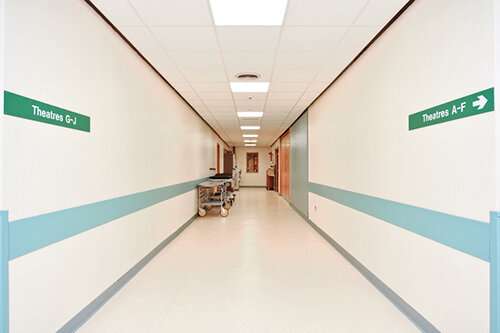Study highlights stark inequality in survival after cardiac surgery between paying and NHS patients

A new study has revealed paying patients are 20 per cent less likely to die or develop major complications, such as reintervention or stroke, after cardiac surgery than NHS patients—findings researchers say cannot be explained by socioeconomic factors alone.
The study, led by academics at the University of Bristol, looked at the data of over 280,000 patients who underwent adult cardiac surgery over a ten-year period from 2009 to 2018 at 31 NHS cardiac units in England. 5,967of these were private payers and 274,242 were government funded.
Private payers are treated by the same clinical teams but can request their surgeon and when to have surgery. They also have access to 'Cinderella services' such as enhanced menus and single rooms.
Umberto Benedetto, Associate Professor in Cardiac Surgery in Bristol Medical School: Translational Health Sciences (THS) from the University of Bristol is an NHS cardiac surgeon and joint lead author of the research, published in The Lancet Regional Health—Europe. He said the study posed important questions about why there is a significant disparity in health outcomes between government funded patients and those accessing NHS healthcare through a private payer-scheme, even after socio-economic factors had been considered.
"These are patients who are treated in the same hospitals, by the same clinical teams, and yet we have found stark differences in survival between those who pay and those who don't," said Prof Benedetto.
"It's tempting to assume this is due to private payers having a more affluent and therefore better quality of life with fewer comorbidities. However, after analyzing the data, we found evidence supporting the hypothesis that private patients receive a better care."
Researchers used data from the National Adult Cardiac Surgery Audit (NACSA) registry. They looked at several outcomes: the primary being in-hospital mortality, but also incidence of in-hospital postoperative cerebrovascular accident (CVA), renal dialysis, sternal wound infection, and re-exploration.
To eliminate socioeconomic status as the sole or primary cause of difference in clinical outcomes between private and NHS payers, the researchers used information on socioeconomic status by linkage with the Iteration of the English Indices of Deprivation (IoD).
Dr. Arnaldo Dimagli, Honorary Research fellow at the University of Bristol and joint lead author said, "Our findings support the hypothesis that a complex interaction between socioeconomic and health system-related factors exists for patients undergoing cardiac surgery. This should stimulate further investigations in order to identify interventions which can tackle health inequalities. For example, it is possible that NHS payers have to wait longer to get their operation. This can expose them to the risk of deterioration before surgery which can affect their outcomes."
More information: Umberto Benedetto et al. Disparity in clinical outcomes after cardiac surgery between private and public (NHS) payers in England. The Lancet Regional Health—Europe. Open AccessPublished:December 15, 2020DOI:doi.org/10.1016/j.lanepe.2020.100003



















